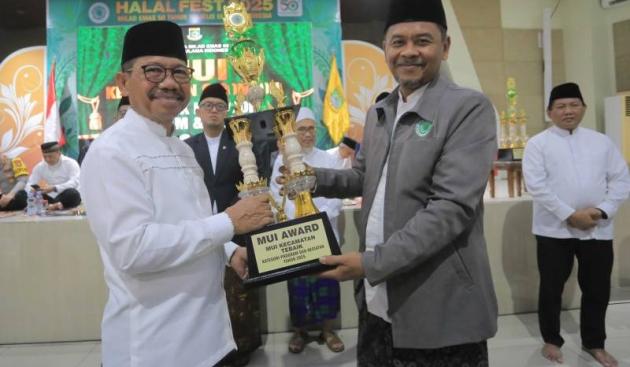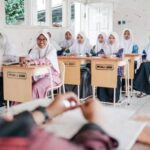Tangerang Mayor Sachrudin hands over a donation for Palestine through MUI.
As a gesture of concern for the humanitarian crisis in Palestine, employees of the Tangerang City Government have donated Rp918.5 million in humanitarian aid.
The symbolic handover was conducted by Tangerang Mayor Sachrudin during the 50th Golden Anniversary celebration of the Indonesian Ulema Council (MUI) at the MUI Building in Tangerang City.
Mayor Sachrudin expressed gratitude and appreciation to all civil servants in the Tangerang City Government who sincerely showed solidarity with the Palestinian people.
“This aid reflects the empathy and compassion that comes from the hearts of Tangerang City Government employees. May it help alleviate the suffering of our brothers and sisters in Palestine, who are enduring prolonged conflict,” said Sachrudin.
The donation was distributed through a collaborative program with Baznas and MUI Tangerang City as part of an event titled “MUI Shares 50 Blessings,” which also included aid for orphans, the underprivileged, and support for 50 mosques across 13 districts.
Sachrudin described this as a historic moment, marking five decades of the ulema’s role in guiding the community and nation-building.
Since its establishment in 1975, MUI has played a strategic role in preserving the purity of Islamic teachings, strengthening brotherhood, and providing fatwas and enlightenment on various community issues.
“Amid the dynamics of the times, MUI continues to serve as a guiding light for the people,” he said.
He added that the 50-year journey is clear evidence of MUI’s dedication, service, and struggle in upholding religious dignity in Indonesia.
“Over the past half-century, MUI has consistently strengthened Islamic brotherhood, educated the community through preaching, and contributed to national development. MUI’s fatwas serve as a reference for the people, and its programs continue to reinforce MUI’s position within Indonesian Muslim society,” he added.
Sachrudin also highlighted new challenges faced by the community in the era of globalization and digitalization, including hoaxes, radicalism, and moral degradation.
“In this situation, MUI’s role becomes even more crucial as the frontline in spreading Islam as a blessing for all, maintaining interfaith harmony, and countering deviant ideologies,” he emphasized.
He expressed hope that MUI would continue to innovate in delivering sermons, engaging the younger generation, and leveraging technology to spread Islamic values effectively and inclusively.






